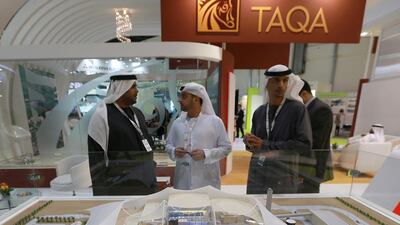Moody's Investors Service affirmed the long-term issuer rating of Abu Dhabi National Energy Company (Taqa) and upgraded the state-controlled oil and gas investment company's baseline credit assessment (BCA) on improved operational performance.
The rating agency affirmed an A3 long-term issuer rating with a stable outlook, reflecting expectations that the firm will continue to benefit from state support, Moody's said. It also upgraded Taqa's BCA by a notch to b1 from b2.
"The upgrade of Taqa's BCA reflects Moody's view that the stabilisation of the operating performance of the oil and gas operations, and a gradual reduction in gross debt, have contributed to a slow improvement in the company's consolidated credit metrics," Moody's said in the report released on Monday.
The agency's b1 standalone assessment reflects the low cash-flow generation of Taqa's oil and gas assets. This contrasts with the strength of the energy company's power and water generation operations in Abu Dhabi, Morocco, India, and Ghana, which produce stable and predictable cash flows.
Taqa relies mainly on its power and water generation assets for debt servicing, which puts pressure on its BCA, Moody's noted, addign that the baseline credit assessment could be upgraded if the company changes its financial profile.
The A3 long-term issuer rating reflects Taqa's "very high" levels of support from the Abu Dhabi government, given the company's strategic importance as a major power and water provider in the emirate, Moody's noted.
"Moody's views Taqa as a government-related issuer that benefits from credit linkages with the government of Abu Dhabi," it said. "The long-term issuer rating of A3 reflects the standalone creditworthiness of Taqa."
State-owned Taqa, in which utilities regulator Abu Dhabi Water and Electricity Authority holds a majority stake, more than doubled its net profit in 2018 from the previous year due to higher revenue driven by rising oil prices in Europe and the strong performance of its power and water division.
Taqa's first-quarter profit, however, dropped 95 per cent because of foreign exchange losses and revaluations within its US-based power asset. The company's profit attributable to shareholders at the end of the first three months fell to Dh6 million.


